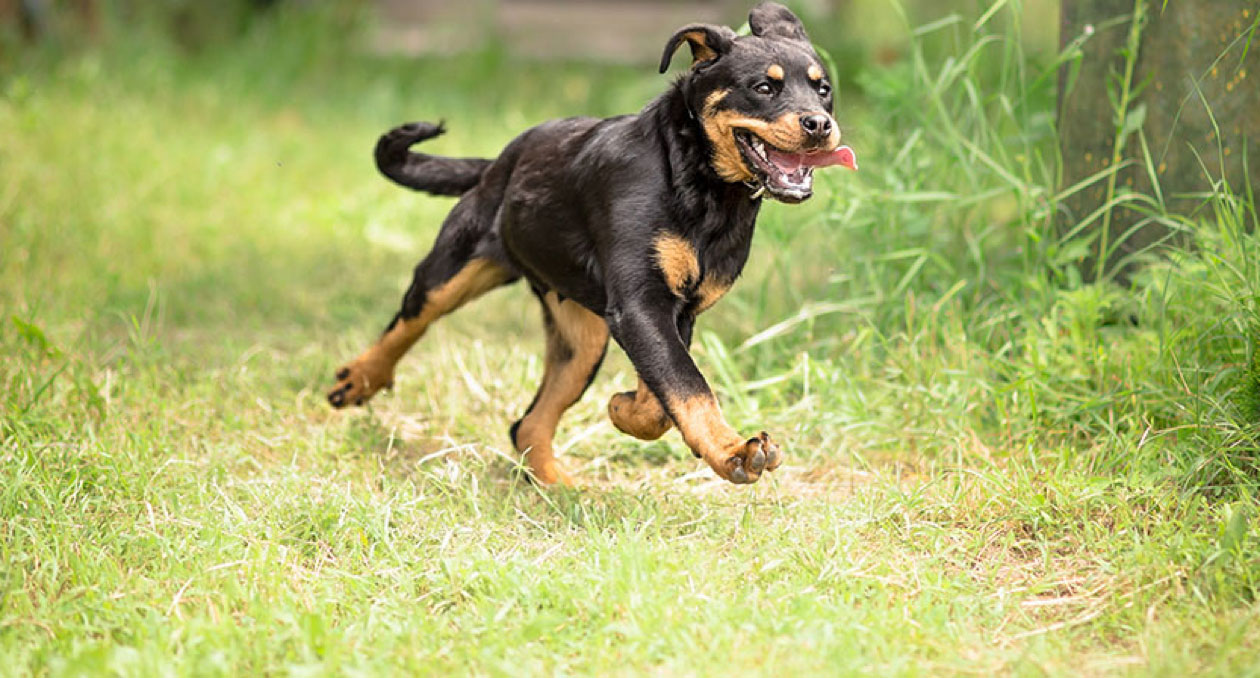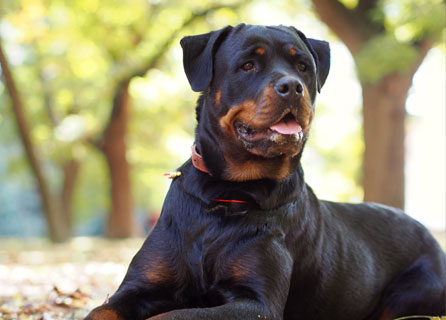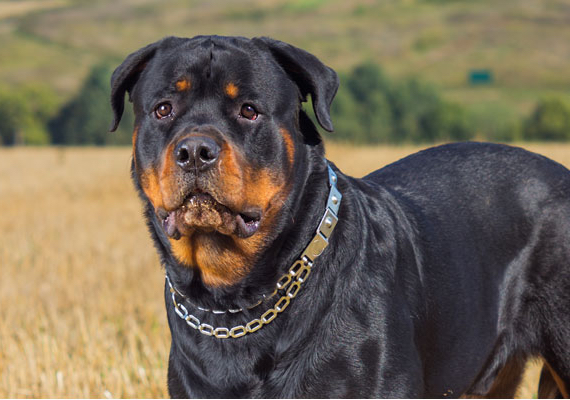
Rottweiler breed guide
Rottweilers are devoted, confident and alert, and often considered one of the smartest breeds. Discover this strong and spirited dog, and get tips on a range of topics from exercise, grooming and behaviour, to what you can do to keep your pet healthy and happy.
Breed information and advice
The Rottweiler is part of the working breed group, and they tend to display great loyalty to their owners. More affectionately known as a Rottie, it’s important to train this powerful dog at a young age to get them into good habits. Here’s more you should know:
- Self-assured and strong-minded, the Rottweiler will respect an assertive owner.Self-assured and strong-minded, the Rottweiler will respect an assertive owner.
- Their coat needs brushing every week or so to avoid tangling.Their coat needs brushing every week or so to avoid tangling.
- They’ll typically weigh between 38kg and 59kg, when fully grown.They’ll typically weigh between 38kg and 59kg, when fully grown.
- If healthy, they can live between 8 and 11 years.If healthy, they can live between 8 and 11 years.
Typical size of a Rottweiler: Medium: 55cm-69cm

Recommended exercise and nutrition
Your strong, athletic Rottweiler will be happy getting as much exercise as they can. A few half hour walks each day should be plenty even for your scrappy puppy, but be sure to keep them on their toes at home, with games and puzzles to keep them stimulated.
The amount you feed your dog will depend on their size, age and level of physical activity but make sure their diet is high-quality and contains all the essential nutrients. Split this across two meals and follow the instructions on the packet, but be careful not to overfeed - if your dog gains weight, it could cause additional pressure on their joints.
More than two hours of exercise per day
You may find yourself trying to keep up with your Rottweiler - but both of you will be healthier and happier for it with a good walk twice a day.

Common health problems and illnesses
There’s no reason why your Rottweiler shouldn’t live a long and happy life. However, being aware of the ailments your dog will be more prone to, along with the associated symptoms, can help you to deal with any health issues that crop up.
Some Rottweilers may develop arthritis or hip dysplasia - a condition where the femur doesn’t fit properly into the hip joint’s pelvic socket. Although they may not show any symptoms in early life, it can cause arthritis or degenerative joint disorder as a dog gets older. Look for any signs of discomfort and/or lameness in their rear legs. Treatment options vary, but may include lifestyle changes, physiotherapy and surgery.
While doing your regular grooming it’s worth keeping an eye out for any lumps and bumps on your dog. Lipomas or fatty growths can be quite common but unless it’s causing the dog difficulty in getting around, these and other benign tumours may not need to be removed. Rottweilers are considered to be at high risk of osteosarcoma. This is a highly invasive tumour which spreads rapidly. If you notice anything unusual, speak with your vet for any underlying causes or symptoms.
It’s possible for Rottweilers to develop subaortic stenosis. This means that the aorta, which carries blood away from the heart and throughout the body, can be prone to narrowing, making the heart work harder to supply oxygen. It’s important to have your dog’s heart checked regularly - the condition usually shows as a heart murmur - and your vet will be able to advise on treatment.
This breed is predisposed to wear and tear of the cruciate ligaments. The cruciate ligament is found in the knee joint - there are actually two in each knee. If it’s ruptured, while not life-threatening, it can be very painful, leading to lameness, swelling and arthritis of the joint.
Cruciate ligament damage can be caused by a range of underlying factors, such as the shape of the bones around the joint, your dogs’ breed, and weight. It can also be caused by a traumatic event. Osteochondrosis Dissecans is a common condition of the joint cartilage that affects Rottweilers. This is when the surface cartilage on the end surface of the bone is abnormal. As a result, within joints such as the shoulder, elbow, knee, and hock (ankle), a flap of cartilage can develop causing lameness. There are many ways to manage affected joints so its best to visit your vet to discuss the problem at the earliest opportunity to minimize ongoing issues.
Gastroenteritis is a condition concerning the inflammation of the stomach and intestines, leading to symptoms including vomiting and diarrhoea. It can be caused by infection or by eating inappropriate foods, and severe cases can be treated with medication. Rottweilers are also susceptible to a more serious bloating condition called gastric dilatation and volvulus or torsion – you can reduce its likelihood by not feeding your dog for at least one hour before or after exercise, and by feeding them from a raised bowl.
Find out about insurance for your Rottweiler
Learn how pet insurance works and what kind of cover you might need for your dog.
Grooming advice
Your Rottweiler’s coat won’t need constant care, just a brush down every week or so to ensure there’s no tangling or matting. Their coat will shed twice a year so keep an eye out for excess hair around the house - when this happens, they’ll need a really good brush-down.
Breeds with shorter coats don’t tend to need a bath as often as their long-haired cousins, so you’ll find that a bath every 8 to 12 weeks will be enough to keep your dog clean as a whistle. Use a special dog shampoo product that’s kind to skin and fur, and be sure to keep the soap out of their eyes.
Clean your Rottweiler’s teeth ideally on a daily basis - like most other dogs there can be the risk of plaque build-up. Ensure their ears are cleaned too - although they’re shorter than on other dogs, neglecting a regular clean could still risk infection.
Fun and interesting facts
- This breed is thought to go all the way back to the Roman Empire, when their hard-working ancestors were used for a variety of tasks including herding cattle during the day and keeping watch over them at night.
- Many Rotties snore while they sleep - it can be surprisingly loud but owners often grow to find it endearing.
- A Rottweiler was nominated by police for a bravery award from the RSPCA in 2009, after he chased off an attacker and waited with the victim until help arrived.
Important information
The content on this page aims to offer an informative introduction to pet breeds, but does not constitute expert veterinary advice. If your dog or cat falls ill or has an injury, contact your vet immediately.
All facts and figures were correct at date of publication and were compiled using a range of sources.
Discover more breeds
Browse our other cat and dog guides to learn about some of the UK’s most popular breeds.